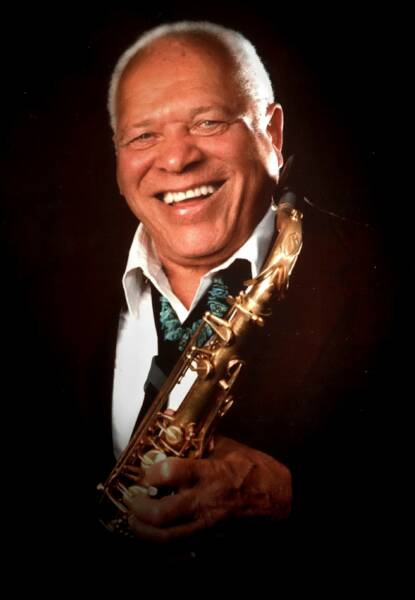South Bend Tribune
November 4, 2005
A Legend Lives On In Dowagiac
A legend lives on in Dowagiac
Horn still blows for jazz musician Franz Jackson at age 93.
By LOU MUMFORD
South Bend Tribune Columnist
A legend lives.
DOWAGIAC -- The sweet sounds still flow from Franz Jackson's tenor saxophone, just like they did when he performed during Prohibition.
That's right, Prohibition. Jackson, at 93, is one of the last musicians to have learned old-style Chicago jazz and to have performed during the big-band era.
That makes him a living jazz legend, says Chris Spencer, manager of Dowagiac's Wood Fire Restaurant, where Jackson has periodically put his talent on display.
"His legend precedes him. He's very, very good," Spencer said. "There's a crowd that comes in just to see him."
Jackson performs with his band, The Jazz Entertainers, but it's the legendary saxophone and clarinet player himself who's the center of attention. The hands of time seem to turn back as he plays such tunes as "Mack the Knife," "Sweet Georgia Brown," "Strut'in with some BBQ" and "Jitterbug Waltz."
Rather than seeing the music, he feels it.
"They (Jackson and his band) get set up, he sits down and it all comes back," Spencer said. "He closes his eyes and there he goes."
Much like Ray Charles, Jackson was drawn to music by the sounds of a piano. Only with Jackson, a native of Rock Island, Ill., it was his mother, Effee, who played it, often with her diaper-clad offspring in her lap.
"I asked her once why she didn't continue playing the piano. She said it was because I was too heavy," Jackson recalled.
He said his mother bought him his first instrument, an alto sax, and he learned to play it by ear. He was just 13 when he began playing in bands.
Three years later while he was living in Chicago he landed his first professional job, playing with boogie-woogie piano player Albert Ammons. Jackson said the $2 or $3 a night he received was good money in those days.
"I played in roadhouses where they had whiskey. That was the whole thing about it, during Prohibition," he said.
Although he didn't drink, Jackson said that made no difference when federal agents raided the establishments.
"I spent a few nights in jail, until they realized I was a horn player," he said.
Jackson branched out, traveling with bands to New Orleans and California where his color, in some places, prohibited him from eating in restaurants. His daughter and business manager, Michelle Jewell, said he received one of his biggest breaks when he went to New York and was hired by prominent band leader Fletcher Henderson.
Jackson, as he had in a band led by Roy "Little Jazz" Eldridge, took a seat formerly occupied by Ben Webster, another standout tenor saxophone player of the era.
"Webster had left the band, so Dad went down to where the band was playing and sat in his (Webster's) chair," she said. "They just assumed the union had sent him."
Jackson likened the trumpet-playing Eldridge to Louis Armstrong. The difference, he said, is that Eldridge lacked Armstrong's ego.
"I didn't play with him (Armstrong), and I didn't care to," Jackson said. Too often, he said, Armstrong basked in the spotlight at the expense of his band.
Jackson also played the bassoon but it was the tenor sax where he made his mark. He said fans sometimes compared him to Coleman Hawkins, a comparison he enjoyed because he considered Hawkins the era's best saxophone player.
He said he'll never know what Hawkins thought of his -- Jackson's -- ability.
"He (Hawkins) came over once while I was playing," he recalled. "He listened a while and he walked away, without saying a word."
Jackson bounced back and forth between various bands until he formed his own band, the Original Jass All-Stars. The band was popular, performing for packed houses at the Red Arrow, a former gangster hideaway, near Berwyn, Ill.
Jackson's talent extended to arranging and writing music, but Jewell said it was left for others to profit.
"He did a lot of arranging and composing for people with big names that he never got credit for. Some became very popular," she said.
Jackson's band toured Vietnam and other locations in the Far East in the late 1960s and early 1970s. In 1980, he formed The Jazz Entertainers, and he toured Europe as a soloist the following year.
At age 84, he received the Midwest Arts Council's Jazz Master grant. Recognized earlier this year by the Jazz Institute of Chicago as one of the five best tenor saxophonists in the world, he's now a candidate for the 2006 National Endowment for the Arts' Jazz Master Fellowship.
A widower -- his wife of 43 years, Virginia, died in 2002 -- Jackson kept an apartment in Chicago until July. He now is a full-time resident of Dowagiac, and he's still on the go, performing at the Wood Fire, various Chicago venues and at jazz festivals and clubs throughout the world.
He still performs because he still can and because he enjoys the give-and-take with his audience. That much is obvious when he talks about some of his performances.
He said he not only plays but sings, using a deep, raspy voice Jewell likened to Armstrong's. Jackson said it's Armstrong's signature song "What a Wonderful World" that has earned him the most applause.
Somehow, that sounds appropriate.
---------------------------------
Living legend Franz Jackson, a jazz musician regarded as one of the five greatest tenor saxophonists in the world, will perform from 6:30 to 9:30 p.m. Nov. 20 at the Wood Fire Restaurant, 134 S. Front St., Dowagiac.
His band, The Jazz Entertainers, also is available for private parties, wedding receptions and other social events.
